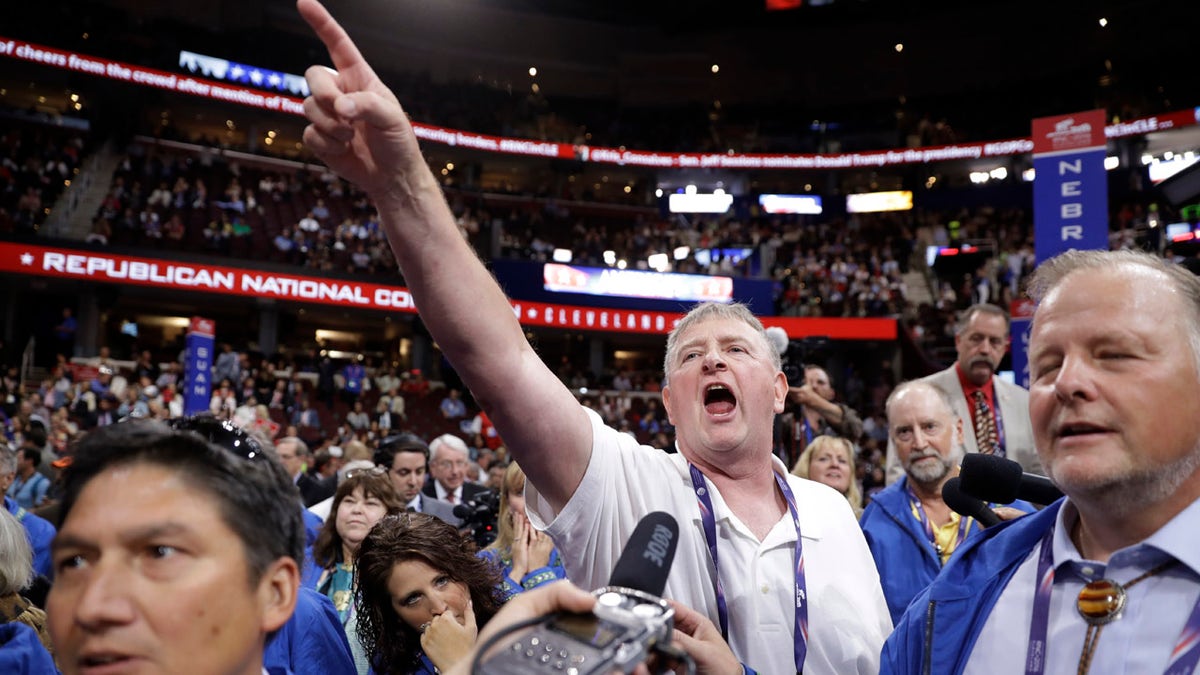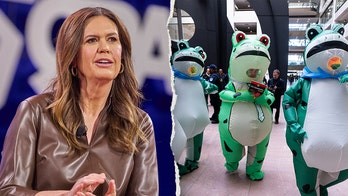
July 19, 2016: Alaska former state Sen. Dave Donley reacts to Alaska's recount during the second day session of the Republican National Convention in Cleveland (AP Photo/Matt Rourke)
JUNEAU, Alaska – A dispute over the allocation of Alaska's delegates at the Republican national convention sparked dissent Tuesday, the day Donald Trump secured his party's nomination for president.
State party chairman Tuckerman Babcock had expected the delegates to be divvied up according to the results of the Alaska GOP's presidential preference poll in March, barring any letters from Sens. Ted Cruz and Marco Rubio releasing their delegates.
Cruz, in winning the poll, picked up 12 Alaska delegates. Second-place finisher Trump got 11 delegates and Rubio got five. Cruz and Rubio later suspended their campaigns.
But the convention's presiding officer awarded all 28 of Alaska's delegates to Trump, drawing a protest from Alaska's delegation.
The chairman of the Republican National Committee, Reince Priebus, said that allocation was in accordance with state party rules and it was upheld.
Alaska party rules state that if a candidate drops out after the state convention but before the national convention, the allocation of delegates will be recalculated. Alaska delegates for all three candidates are attending this week's national convention in Ohio.
In a statement, Babcock said the Republican National Committee misinterpreted state party rules. But he also said: "We are all united" behind Trump and Trump's running mate, Mike Pence.
Babcock said earlier Tuesday that Alaska delegates had come around to accepting that Trump would be the party's nominee, though he said a couple might still be struggling with supporting Trump.
Babcock said the alternative to Trump is presumptive Democratic nominee Hillary Clinton and predicted a Clinton presidency would spell "doom and gloom" for Alaska.
Former state Rep. Peggy Wilson, a Trump delegate from Wrangell, said Trump isn't trying to become president for fame or glory because he's already rich and famous.
"He's here because he really cares about America, and that is so awesome," she said.
Wilson said Ben Carson was her first choice as the GOP nominee but said she's excited to see Republicans start to pull together for Trump.
Babcock said Trump is a different kind of candidate, and he doesn't know what to expect when Trump addresses the convention this week.
National committeeman and Trump delegate Peter Goldberg said he thinks Trump might address the economy, trade, the military and immigration -- possibly clearing up his positions on immigration.
Trump "married an immigrant, he's not anti-immigrant," Goldberg said, adding that Trump insists "he just doesn't want to let anybody in if we don't really know who they are and why they're coming," Goldberg said.
Also Tuesday, Wilson and Babcock defended Trump's wife, Melania Trump, amid criticism that two passages from her convention speech were strikingly similar to a 2008 speech from Michelle Obama.
Wilson said Trump opponents are desperate to find something negative about Melania Trump. Wilson called her classy and intelligent and said she spoke from her heart.
"I just thought that she is such a sweetie," Wilson said. "In my opinion, we've had first ladies that stood out and that America truly kind of loved. Nancy Reagan, of course, was one. I think Laura Bush was one. I think Jackie Kennedy a lot of people really liked. And I think that this lady is going to be someone that a lot of people can really identify with."
Babcock said he was struck by Melania Trump's description of her parents, her upbringing and becoming an American citizen.
"I don't think you could ever compare her speech to Michelle Obama's because Melania Trump focused a lot on hard work and working for your opportunities, whereas the Obamas focus on handouts and relying on government for your opportunity," he said.
Babcock suggested that if a speechwriter knew about the similarities that person should accept responsibility.











































